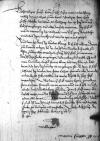Ewr F(urstlich) G(naden) ⌊⌋ des datum stet ⌊Heilsperg⌋, / den IX htag(!) Ianuarii hab ich empfangen und alles innhaltz vernomen. / Sag E(wr) F(urstlich) G(naden) umb die vereerung des wildprets unnd fisch, / gantz dienstlichen unnd vleissigen danckh / und wer der gar ob net gewest. /
Sovil dann die dreissig ducaten belangt, / So E(wr) F(urstlich) G(naden) meinem diener zue ⌊Cracaw⌋ erlege lassen, / die ich dem ⌊Nicolao Fridwaldt⌋ zue ⌊Rhom⌋ zue bezahlen verordnet. / Fueg ich E(wr) F(urstlich) G(naden) zu vernemen, / das ich jetzo schreiben empfangen, / gemelter ⌊Fridwaldt⌋, / ehe und mein comission brieff hinein komen tods verschiden ist, / also das er dise dreissig ducaten nit empfangen hat. / Sodann E(wr) F(urstlich) G(naden) soll dreissig ducaten dem herrn ⌊Caspar Hannaw⌋, / oder jemands andern bezalt haben wellen, / das werden dieselb den ⌊Jorg Hegl⌋ verstendigen, / wie dann E(wr) F(urstlich) G(naden) verrer begern, / gemeltem herrn Caspar Hannaw, wo er meine leut umb gelt ansuchen wurde, / ime dasselb erlegen zu lassen. / Ist an E(wr) F(urstlich) G(naden) mein bit, / dieselb wellen mir die suma, / wieviel ich ime zuebezalln verordnen soll benennen paper damaged⌈[nen]nen paper damaged⌉ [...] paper damaged⌈[...][...] paper damaged⌉l dero verordnung wolg beschehen. / Wolt E(wr) F(urstlich) G(naden) ich, / dero ich mich diennstlich bevelhen thue, / uff derselben schreiben zue antwurt nit verhalten. /
 AAWO, AB, D.97, f. [2] mised in numbering after f. 63
AAWO, AB, D.97, f. [2] mised in numbering after f. 63

